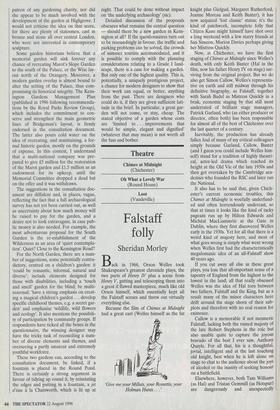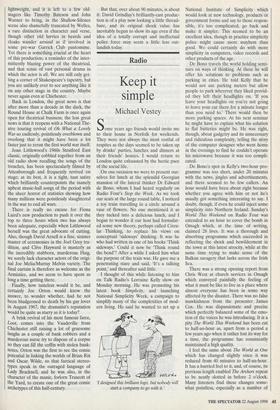Theatre
Chimes at Midnight (Chichester) Oh What a Lovely War (Round House) Loot (Vaudeville)
Falstaff folly
Sheridan Morley
Back in 1966, Orson Welles took Shakespeare's greatest chronicle plays, the two parts of Henry IV plus a scene from Henry V, gutting and telescoping them into a great if flawed masterpiece, much like old Orson himself, which essentially kept all the Falstaff scenes and threw out virtually everything else.
Because the film of Chimes at Midnight had a great cast (Welles himself as the fat `Give me your Millais, your Rossettis, your Holman Hunts . . knight plus Gielgud, Margaret Rutherford, Jeanne Moreau and Keith Baxter), it has now acquired 'lost classic' status; it's the kind of patchwork, incomplete folly that Citizen Kane might himself have shot over a long weekend with a few starry friends at San Simeon, Marion Davies perhaps giving her Mistress Quickly.
Now, at Chichester, we have the first staging of Chimes at Midnight since Welles's death, with only Keith Baxter (Hal in the film, now his father Henry IV on stage) sur- viving from the original project. But we do also get Simon Callow, Welles's representa- tive on earth and still midway through his definitive biography, as Falstaff, together with Sarah Badel as Mistress Quickly in a brisk, economic staging by that still most underrated of brilliant stage managers, Patrick Garland, who (as either producer or director, often both) has been responsible for almost all of the best of Chichester over the last quarter of a century.
Inevitably, the production has already fallen foul of many of my critical colleagues simply because Garland, Callow, Baxter (and I guess you could include Welles him- self) stand for a tradition of highly theatri- cal, actor-led drama which reached its height at the Old Vic of the late 1950s and then got overtaken by the Cambridge aca- demics who founded the RSC and later ran the National.
It also has to be said that, given Chich- ester's current economic troubles, this Chimes at Midnight is woefully underfund- ed and often horrendously undercast, so that at times it looks like the kind of tacky pageant run up by Hilton Edwards and Micheal MacLiammoir at the Gate in Dublin, where they first discovered Welles early in the 1930s. Yet for all that there is a weird kind of majesty here, and most of what goes wrong is simply what went wrong when Welles first had the characteristically megalomanic idea of an all-Falstaff show 40 years ago.
If you cut away all else in these great plays, you lose that all-important sense of a tapestry of England from the highest to the lowest in the land; all that really obsessed Welles was the idea of Hal torn between two fathers, Falstaff and the King, but as a result many of the minor characters here drift around the stage shorn of their sub- plots and therefore with no real reason for existence.
Callow is a memorable if not mesmeric Falstaff, lacking both the ruined majesty of the late Robert Stephens in the role but also unable quite to capture the joyous bravado of the best I ever saw, Anthony Quayle. For all that, his is a thoughtful, jovial, intelligent and at the last touching old knight, best when he is left alone on stage to chat to the audience about the joys of alcohol or the inanity of seeking honour on a battlefield.
Elsewhere, however, both Tam Williams (as Hal) and Tristan Gemmill (as Hotspur) are dangerously and unexpectedly lightweight, and it is left to a few old- stagers like Timothy Bateson and John Warner to bring, in the Shallow-Silence scene also shamefully truncated by Welles, a rare distinction in character and verse, though other old luvvies in beards and cloaks wander around as if involved in some pre-war Garrick Club pantomime. Yet there is something crucial at the heart of this production; a reminder of the inter- mittently blazing power of the theatrical, and that sense of vast personal drama in which the actor is all. We are still only get- ting a corner of Shakespeare's tapestry, but you are unlikely ever to see anything like it on any other stage in the country. Maybe never again even at Chichester.
Back in London, the great news is that after more than a decade in the dark, the Round House at Chalk Farm is once again open for theatrical business; the less great news is that it reopens with a National The- atre touring revival of Oh What a Lovely War so endlessly, pointlessly overblown and overlong that it might have been a lot faster just to rerun the first world war itself.
Joan Littlewood's 1960s Stratford East classic, originally cobbled together from an old radio show recalling the songs of the trenches, has been spectacularly filmed by Attenborough and frequently revived on stage; at its best, it is a tight, taut satire which brilliantly counterpoints the inanely upbeat music-hall songs of the period with the sheer horror of statistics showing how many millions were pointlessly slaughtered in the war to end all wars.
There is really no excuse for Fiona Laird's new production to push it over the top to three hours when two has always been adequate, especially when Littlewood herself was the great advocate of cutting. Also, though David Arnell is a fine, sinister master of ceremonies in the Joel Grey tra- dition, and Clive Hayward is masterly as the incredibly stubborn, murderous Haig, we sorely lack character actors of the origi- nal Joe Melia/Murray Melvin variety. The final curtain is therefore as welcome as the Armistice, and we seem to have spent as long a time getting there.
Finally, how tasteless would it be, and certainly Joe Orton would know the answer, to wonder whether, had he not been bludgeoned to death by his gay lover in August 1967, the dramatist's reputation would be quite as starry as it is today?
A brisk revival of his most famous farce, Loot, comes into the Vaudeville from Chichester still raising a lot of gruesome laughs as a couple of bank robbers and a murderous nurse try to dispose of a corpse so they can fill the coffin with stolen bank- notes. Orton was the first to see the comic Potential in linking the worlds of Brian Rix and Oscar Wilde, so that farcical stereo- types speak in the outraged language of Lady Bracknell, and he was also, in the character of the manic, forlorn Truscott of the Yard, to create one of the great comic archetypes of this half-century. But that, over about 90 minutes, is about it: David Grindlay's brilliantly-cast produc- tion is of a play now looking a little thread- bare, and its original shock value has inevitably begun to show its age even if the idea of a totally corrupt and ineffectual police force may seem a little less out- landish today.

























































 Previous page
Previous page